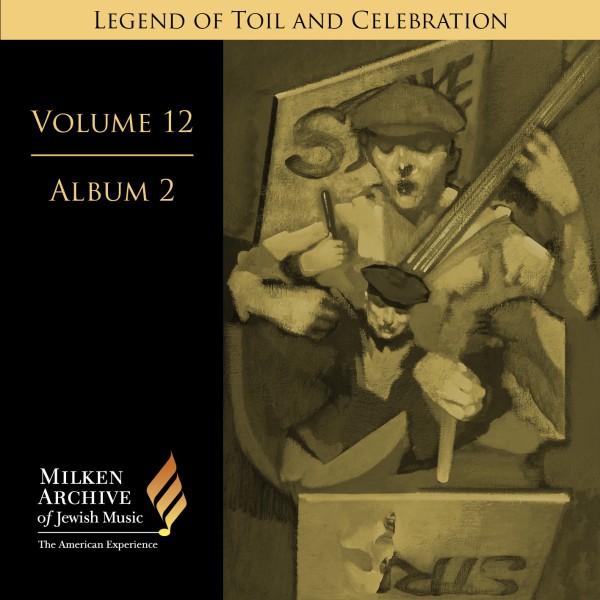in dem land fun piramidn,
s’geven a kenig, beyz un shlekht;
zaynen dort geven di yidn,
zayne diner, zayne knekht.
kinder hot men dan farmoyert
ven a tsigl hot gefelt;
ver veys vi lang
es volt gedoyert,
ot di viste shklafn velt,
ven in land fun piramidn
volt nit zayn a groyser held,
velkher hot gekemft far yidn
mit zayn khokhme un zayn shverd?
Tracks
Track |
Time |
Play |
| Piramidn | 01:51 |
Liner Notes
The Pesah song Piramidn (Pyramids), which is included in this volume in a contemporary choral arrangement commissioned by the Milken Archive, is typical of the pedagogic uses to which an entire corpus of simple Yiddish songs was put and for which many were created expressly. Set to an anonymous melody, the words, penned by David Edelstadt (1866–1892)—one of the most famous labor and sometimes radical socialist poets—are among his more benign and deliberately childlike and innocently charming poems. The song betrays a secular socialist slant on the traditional Pesah narrative, eliminating all references to Divine intervention and emphasizing instead Moses as a people’s hero and a prototype of future labor leaders who would rescue economically and socially if not politically enslaved workers from managerial subjugation. If not for Moses’ own initiative, rather than his acceptance of a divinely appointed mission, the Jewish people would still be slaves in Egypt. Piramidn illustrates the way in which Jewish holydays were reimagined and stripped of their religious origins and dimensions, refracted anew through secular cultural prisms, and taught to children as part of nonreligious Yiddishist curricula. In its publication in a songster for the Arbeter Ring’s summer camp, Kinder Ring, which was compiled and edited in 1960 by Samuel Bugatch, one of its music directors, the tune is identified as a “folk” melody. But it has not been located independent of its lyrics in any folk tune collection or known folk repertoire.
Apart from such politically neutral didactic songs, however, the literary and song repertoires of the postwar period indicate that earlier, more directly socialist messages and overtones had become muted—often to the point of subliminal reference even in Yiddishist enclaves. Certainly they were not much a part of history lessons or musical programs in either religious weekend congregational or day schools. To the extent that these matters might have surfaced, they would have been glossed over without much emphasis on (and usually without mention of) the underlying political dimensions or politically related affiliations, activities, or sympathies.
Lyrics
Words: David Edelstadt
Sung in Yiddish
In the land of pyramids,
There was a wicked and evil king;
There the Jews were
His servants, his slaves.
They filled the walls with children
Whenever they were short a brick;
Who knows how long
This bleak slave-world
Would have lasted,
If in the land of pyramids
There had not been a great hero,
Who fought for the Jews
With his wisdom and his sword?
Credits
Composer: AnonymousPerformers: Coro Hebraeico; Amy Goldstein, Soprano; Neil Levin, Conductor
Translation: Adam J. Levitin and Eliyahu Mishulovin
